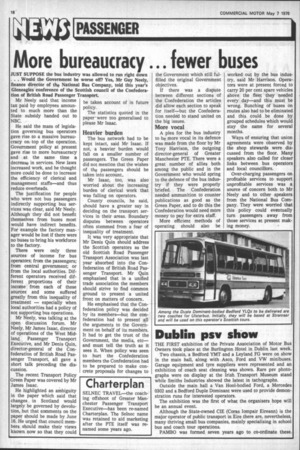More bureaucracy
Page 20

If you've noticed an error in this article please click here to report it so we can fix it.
• • . fewer buses JUST SUPPOSE the bus industry was allowed to run right down . . . Would the Government be worse off? Yes, Mr Guy Neely, finance director of the National Bus Company, told this year's Gleneagles conference of the Scottish council of the Cortfederation of British Road Passenger Transport.
Mr Neely said that income tax paid by employees amounted to much more than the State subsidy handed out to NBC.
He said the mass of legislation governing bus operators gave rise to a massive bureaucracy on top of the operation. Government policy at present gave rise to more bureaucracy and at the same time a decrease in services. New laws increased work, and he thought more could be done to increase the efficiency of clerical and management staffs—and thus reduce overheads.
The justification for people who were not bus passengers indirectly supporting bus services was clear, said Mr Neely. Although they did not benefit themselves from buses most would have indirect benefits. For example the factory manager would be lost if there were no buses to bring his workforce to the factory.
There were only three sources of income for bus operators; from the passengers; from central government; or from the local authorities. Different operators received different proportions of their income from each of these sources and some suffered greatly from this inequality of treatment — especially when local authorities had a policy of not supporting bus operations.
Mr Neely, was talking at the open discussion forum. Mr Neely, Mr James Isaac, director of operations of the West Midland Passenger Transport Executive, and Mr Denis Quin, director-general of the Confederation of British Road Passenger Transport, all gave a short talk preceding the discussion.
The recent Transport Policy Green Paper was covered by Mr James Isaac.
He highlighted an ambiguity in the paper which said that changes in Scotland would largely, be governed by devolution, but that comments on the paper should be made by June 16. He urged that council members should make their views known now so that they could be taken account of in future policy.
The statistics quoted in the paper were too generalised to please Mr Isaac.
Heavier burden
The bus network had to be kept intact, said Mr Isaac. If not, a heavier burden would fall on a smaller number of passengers. The Green Paper did not mention that the wishes of the passengers should be taken into account.
Mr Isaac, too, was also worried about the increasing burden of clerical work that was falling on operators.
County councils, he said, should have a greater say in deciding on the transport services in their areas. Boundary disputes between operators often stemmed from a fear of inequality of treatment.
It was very appropriate that Mr Denis Quin should address the Scottish operators as the old Scottish Road Passenger Transport Association was last year absorbed into the Confederation of British Road Passenger Transport. Mr Quin emphasised that in a unified trade association the members should strive to find common ground to present a united front on matters of concern.
He emphasised that the Confederation policy was decided by its members—but the confederation had to present all • the arguments to the Government on behalf of its members. It had to get the trust of the Government, the media, etc— and must tell the truth as it sees it. When policy was seen to hurt the Confederation members the Confederation had to be prepared to make concrete proposals for changes to the Government which still fulfilled the original Government objectives.
If there was a dispute between different sections of the Confederation the articles did allow each section to speak for itself—but the Confederation needed to stand united on the big issues.
More vocal
A plea for the bus industry to be more vocal in its defence was made from the floor by Mr Tony Harrison, the outgoing director-general of Greater Manchester PTE. There were a great number of allies both among the public and in the Government who would spring to the defence of the bus industry if they were properly briefed. The Confederation needed ammunition to counter publications as good as the Green Paper, and to do this the Confederation would need more money to pay for extra staff.
More efficient methods of operating should also be worked out by the bus industry, said Mr Harrison. Operators were at present forced to carry 20 per cent spare vehicles above the fleet they needed every day—and this must be wrong. Bunching of buses on routes also had to be eliminated and this could be done by grouped schedules which would stay the same for several months.
Ways of ensuring that union agreements were observed by the shop stewards were discussed from the floor. Many speakers also called for closer links between bus operators and local councillors.
Over-charging passengers on profitable services to support unprofitable services was a source of concern both to Mr Neely and to other speakers from the National Bus Company. They were worried that this policy could eventually turn passengers away from those services at present making money.




























































































